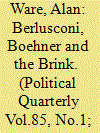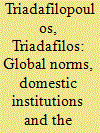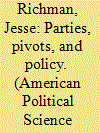| Srl | Item |
| 1 |
ID:
130945


|
|
|
|
|
| Publication |
2014.
|
| Summary/Abstract |
In the early autumn of 2013 large minorities in Italy and the United States fermented crises that badly disrupted the government of the two countries. These cases were widely understood as instances of dysfunction in established democracies that would rarely be replicated elsewhere. However, while all the conditions that generated the crises are unlikely to be evident in other established democracies three important factors that caused the disruptions in the American and Italian political processes are also sources of political conflict in Britain. They are the powers of the second legislative chamber, the weakening links between parties and social groups, and the redrawing of electoral boundaries. All of them present problems for political reform in Britain, and understanding the role they played in the two political crises of 2013 is important for future reform in Britain.
|
|
|
|
|
|
|
|
|
|
|
|
|
|
|
|
| 2 |
ID:
093789


|
|
|
|
|
| Publication |
2010.
|
| Summary/Abstract |
This article examines the liberalisation of immigration policy in Canada and the US in the post-World War II era. I argue that shifting norms pertaining to race, ethnicity, and human rights cast longstanding discriminatory policies in Canada and the US in a highly critical light. Opponents of racially discriminatory immigration policies exploited this shift in normative contexts to highlight the disjuncture between Canada and the US' postwar commitments to liberal norms and human rights, on the one hand, and their extant policy regimes, on the other. The resulting pressure set in motion comparable processes of policy stretching and unravelling, which culminated in policy shifting in the mid-1960s. Policy shifting was, however, subject to very different political dynamics. Whereas Canada's institutional configuration granted the executive branch and bureaucracy a high degree of autonomy that enabled experimentation, the greater openness of the American political system led to a more politicised process, marked by compromises and deal-making. Thus while changing norms prompted the liberalisation of immigration policies in both countries, differences in their domestic political contexts resulted in very different admissions regimes.
|
|
|
|
|
|
|
|
|
|
|
|
|
|
|
|
| 3 |
ID:
105176


|
|
|
|
|
| Publication |
2011.
|
| Summary/Abstract |
Identifying policy status quo locations is a precondition for testing key predictions of many spatial models of legislative politics, but such measures have proved to be extremely difficult to construct. This study applies a novel technique that measures policy locations in relation to legislators' preferences. The resulting status quo estimates allow for a direct test of the policy consequences predicted by pivotal politics and party cartel theories of legislative politics. The empirical tests indicate that parties interact with pivotal politics to contribute to policy gridlock and shape policy change. By bringing pressure to bear on pivotal politics "pivots" and by blocking policy changes that would "roll" the party, parties increase the range of policies subject to gridlock in the American political system.
|
|
|
|
|
|
|
|
|
|
|
|
|
|
|
|
| 4 |
ID:
151536


|
|
|
|
|
| Summary/Abstract |
No matter what numerous political opponents and rivals, the liberal press, Hollywood stars, European leaders, minorities, and high-brow experts think of this man with dyed hair, the phrase "President Trump" will become one of the buzz words in world affairs in the years to come (and certainly during the next four years). Donald Trump is not a contingency or an alien that has come from Mars or Alpha Centauri to blow up the habitual earthly politics.
|
|
|
|
|
|
|
|
|
|
|
|
|
|
|
|